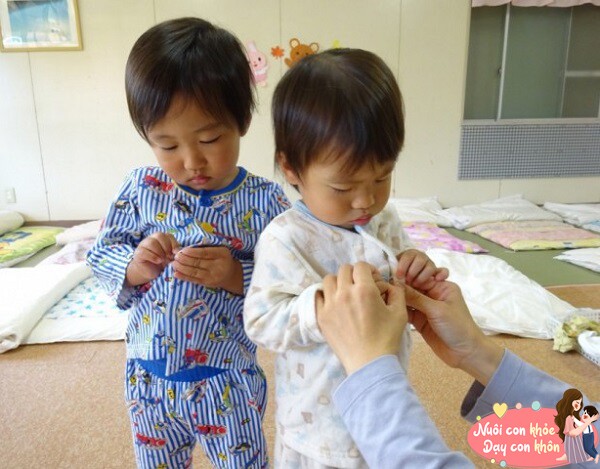A renowned scientist mentioned that parents who wish for their children to be more intelligent should remember the “37” principle. This principle emphasizes two crucial ages: three and seven.
Neural connections develop rapidly when a baby is born. The number of these connections peaks when the child is two years old. However, neural connections have a unique characteristic: they deteriorate if not used and only flourish when properly stimulated.
There will be two pruning processes, one at age three and another at age seven. These aim to eliminate unused and degenerated neural connections.
Thus, from birth to age seven, parents should expose their children to a variety of experiences and environments to maximize the preservation of these connections, fostering increased intelligence.


Ages 0-6: Strengthening the Mother-Child Bond
Psychologist Winnicott stated that at six months old, a child feels like they are one with their mother. During this stage, the child hasn’t clearly distinguished themselves from their mother, expecting their needs to be immediately met.
When hungry, the mother feeds the child; when thirsty, the mother gives them a drink. When the child is sleepy, the mother changes their diaper. These actions create a deep connection, a profound attachment between the child and mother, forming a solid foundation for the child’s psychological development.

Strengthening the mother-child bond.
If the mother fails to promptly meet these needs, the child may doubt the world and become fearful of their surroundings. They will feel lonely and unprotected, leading to the development of negative emotions such as anxiety.
These emotions can persist and influence how the child interacts with the world in the future. When children do not receive the necessary care and protection, they begin to believe that the world is an unsafe place, impacting their psychological development in subsequent stages.

Ages 7-12 Months: Encourage More Crawling
Many pediatricians and education experts recommend that children spend ample time crawling, ideally between 500 and 800 hours.
Crawling naturally exercises the spine, enhancing flexibility and strength. Additionally, large movements such as stretching the arms and legs and twisting the body are stimulated, thus developing gross motor skills.
Moreover, crawling helps refine fine motor skills as children learn to control their fingers and hands to grasp and move objects around them.
Crawling is also a highly interactive activity that contributes to the development of a child’s senses. Touching different surfaces, feeling temperatures, and sensing the smoothness or roughness of objects refine their sense of touch.
This, in turn, stimulates the brain, aiding in the development of hand-eye coordination. When crawling, all the senses work in harmony, promoting robust and sustained brain development.

Encourage more crawling.

Ages 1-2: Self-Feeding
Children should start self-feeding from the age of one as it refines fine motor skills and enhances hand-eye coordination. Self-feeding encourages independence and confidence in exploring the world around them.
When holding a spoon, chopsticks, or even food, children learn to control their movements more precisely.
Additionally, self-feeding plays a crucial role in stimulating the brain. Each time a child experiments with food, whether it’s recognizing shapes, colors, or flavors, their senses and cognitive abilities are enhanced. Through this process, they also develop healthy eating habits and learn to make nutritious food choices.
Another benefit of self-feeding is that it helps children recognize feelings of hunger and fullness. When children self-regulate their food intake, they learn to listen to their bodies and understand their needs.

Ages 2-3: Encouraging Decision-Making
If your child wants to dress themselves, let them. Allow them to put on their shoes and climb stairs independently. When children accomplish these tasks, a sense of achievement becomes a powerful motivator, realizing they can overcome challenges and achieve small daily goals.
Dressing themselves and tying their shoes are valuable lessons in independence. Children learn to choose clothing suitable for the weather and develop an understanding of color coordination and fashion, fostering creative thinking.
Furthermore, encouraging these activities contributes to their problem-solving skills. When faced with difficulties in dressing or tying shoes, children will ask questions and find solutions, thus developing logical thinking and critical thinking abilities.

Encouraging decision-making and independence.

Ages 3-7: Fostering Independence
Psychologist Erikson noted that from ages three to seven, children have a strong desire to act according to their will. This is when they want to explore their surroundings, imitate adult behaviors, and take on more responsibilities.
When children feel empowered to take on responsibilities, a sense of purpose emerges, and they become proactive in undertaking future tasks.
Encouraging children to engage in independent activities such as dressing themselves, helping with household chores, or participating in interactive games that develop life skills and build self-confidence is essential.
When children sense their parents’ trust in their capabilities, they feel valued and motivated to continue exploring new challenges. This creates a positive cycle where children’s confidence grows with each accomplished task, inspiring them to take on more complex tasks.
Child development is a long journey, focusing not only on intellectual growth but also on establishing a solid foundation for emotional and social skill development.
6 Pivotal Moments to Teach Your Children Independence: A Recipe for Their Future Success and Gratitude
Introducing the art of instilling independence in your child: Empowering them to take charge of their lives and fostering a sense of responsibility. It is imperative for parents to embrace these pivotal stages in their children’s lives, seizing the opportunity to nurture their decision-making skills and, in turn, cultivate a strong sense of independence.




































